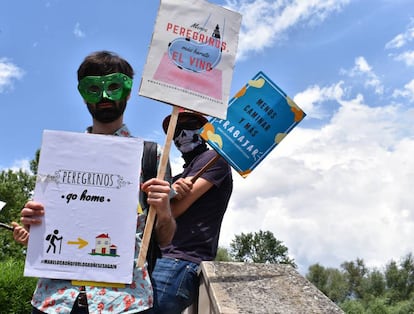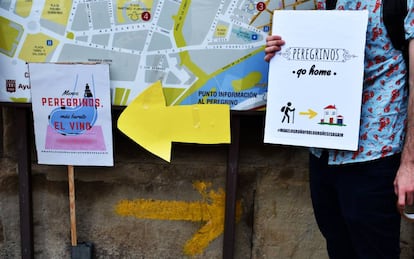Are “smelly” hipsters ruining Spain’s Camino de Santiago pilgrim route?
Protesters in wine-making region of La Rioja say tourists are pushing prices up, and that’s not all...

Taking its lead from protests in cities around the world as diverse as San Francisco, Sydney, London and Barcelona, where wealthy incomers are accused of gentrifying traditional working class areas, pushing up prices and forcing locals out, a group in Logroño, the main city of the northern Spanish region of La Rioja, has launched STOP Gentrificación Logroño.
Many pilgrims are non-believers and engage in sexual relations along the way, undermining Catholic morality STOP Gentrificación Logroño
A month into its campaign, the group’s Facebook page has already sparked controversy by reporting on rent hikes in the city, and on the growing numbers of tourist apartments let though platforms such as Airbnb, along with other outrages such as the decision by some bars in Logroño to serve wines from the rival Ribera del Duero region to meet the tastes of visitors presumably unaware that they are in one of the world’s most illustrious wine-making regions.
Taking advantage of the momentum they have gained, the campaigners have now turned their sights on Spain’s famous pilgrimage route, the Way of St. James, known in Spanish as the Camino de Santiago, which passes through Logroño en route to Santiago de Compostela in Spain’s Galicia region.
A group of young people marched through the center of Logroño on July 11 and staged a protest outside two hostels used by pilgrims making a stopover in the city, brandishing placards reading (in English) “Pilgrims go home” and (in Spanish) “Less walking and more working.” Another sign read “Fewer pilgrims, cheaper wine.”

The protesters say they are not seeking an end to the Way of St. James, but instead are calling attention to the problems caused in the city center by growing numbers of pilgrims, such as rent hikes and higher prices in bars and restaurants.
“What’s more, the pilgrims look terrible, they are dirty and smelly. In the middle ages, they brought culture, today they just have black feet,” says one member of the group, adding that it isn’t just Logroño that is being brought into disrepute by the pilgrims: the route itself is in peril.
“One of the most serious aspects of the Camino de Santiago is that it is a Christian tradition, but many pilgrims are non-believers and they engage in sexual relations along the way, undermining the essence of Catholic morality,” the protester said.
In the middle ages, the pilgrims brought culture, today they just have black feet
STOP Gentrificación Logroño
To make matters worse, as the demonstrators point out, most pilgrims do not even bring much money into the city during their stay: the hostel is free, while visitors eat as cheaply as possible, failing to appreciate La Rioja’s long-standing tradition of tapas and pinchos.
STOP Gentrificación Logroño says the solution is simply to cut Logroño out of the Camino altogether and divert the Way of St. James at the Ebro river, which divides La Rioja from neighboring Navarre. In fact, during its protest on July 11, some campaigners changed the direction of the traditional yellow signposts away from Logroño. The organization has now launched a petition among locals in support of its crusade.
English version by Nick Lyne.
Tu suscripción se está usando en otro dispositivo
¿Quieres añadir otro usuario a tu suscripción?
Si continúas leyendo en este dispositivo, no se podrá leer en el otro.
FlechaTu suscripción se está usando en otro dispositivo y solo puedes acceder a EL PAÍS desde un dispositivo a la vez.
Si quieres compartir tu cuenta, cambia tu suscripción a la modalidad Premium, así podrás añadir otro usuario. Cada uno accederá con su propia cuenta de email, lo que os permitirá personalizar vuestra experiencia en EL PAÍS.
¿Tienes una suscripción de empresa? Accede aquí para contratar más cuentas.
En el caso de no saber quién está usando tu cuenta, te recomendamos cambiar tu contraseña aquí.
Si decides continuar compartiendo tu cuenta, este mensaje se mostrará en tu dispositivo y en el de la otra persona que está usando tu cuenta de forma indefinida, afectando a tu experiencia de lectura. Puedes consultar aquí los términos y condiciones de la suscripción digital.








































